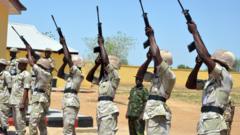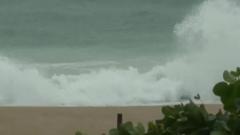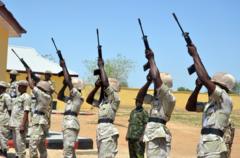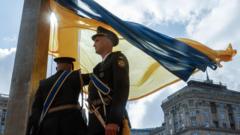As Russian forces advance in the Donetsk region, humanitarian efforts lead evacuations from towns like Dobropillia, where residents endure constant danger and devastation. Despite peace talks, experiences of war fuel deep mistrust and the desire to reclaim lost territory.
Struggles and Evacuations: Life Amidst the Assault in Donetsk

Struggles and Evacuations: Life Amidst the Assault in Donetsk
In the war-torn region of Donetsk, Ukrainian citizens face daily attacks as they seek safety and escape the devastation caused by the ongoing conflict.
The Donetsk region of Ukraine has become a focal point of escalating conflict, as Russian forces continue to make substantial territorial gains. With around 70% of this region now under Moscow's control, the humanitarian situation grows increasingly dire, prompting urgent evacuations from areas like Dobropillia, a town perilously close to the front lines.
Accompanied by two dedicated volunteers from Universal Aid Ukraine, I ventured into Dobropillia, only 8 kilometers (about five miles) from Russian positions, intending to assist those seeking to flee the violence. Our fortified convoy sped through desolate streets, cloaked in greenery to evade drone surveillance. Many residents have left, and those who remain rush out only for basic supplies, keenly aware of the daily bombardments that plague their lives.
The stark reality becomes clear as we pass damaged homes, with many structures reduced to ruins. Vitalii Kalinichenko, a 56-year-old resident, stands ready for evacuation with only a few possessions. Nearby, a crater and debris tell the harsh story of a recent attack. He recounts the trauma of the previous nights as Russian drones have wreaked havoc in his neighborhood.
As our team prepares for the next evacuation, a constant reminder of the risks permeates the atmosphere. The sound of explosions sends an elderly woman, out with her shopping trolley, rushing for cover while we hasten to load evacuees into our vehicle.
One of the evacuees, Anton, aged 31, who leaves behind his mother, expresses a longing for peace. “We need negotiations to resolve this conflict without further bloodshed,” he proposes. His sentiments reflect a desire for resolution, yet Varia, another volunteer, harbors a contrasting view. “Trusting Putin is impossible. We can’t cede Donbas; it would only empower their aggression,” she remarks, emphasizing the necessity of resisting.
As the stakes rise, President Zelensky remains hopeful Ukraine can stave off complete loss, even as the West prepares to supplement their defenses if necessary. The significance of holding Donbas is underscored by its connection to further regions, thus retaining momentum in the broader fight against Russian aggression.
Under the cover of night, injured soldiers are transported to a field hospital. The medical teams are inundated with serious cases, underscoring the brutal violence that marks the conflict. The head surgeon, Lieutenant Dima, articulates the grim picture of their reality, longing for an end to the pain and chaos.
On my return journey, the landscape starkly illustrates the ongoing conflict with its barbed wire and makeshift defenses, all echoes of a determined strategy against the continuing Russian threat. The situation remains precarious as both diplomacy and conflict play out, leaving the people of Donetsk in a state of resilience and resolve amid uncertainty. For the moment, they cling to hope amidst the devastation, dedicated to defending their homeland and pursuing a future devoid of warfare.





















